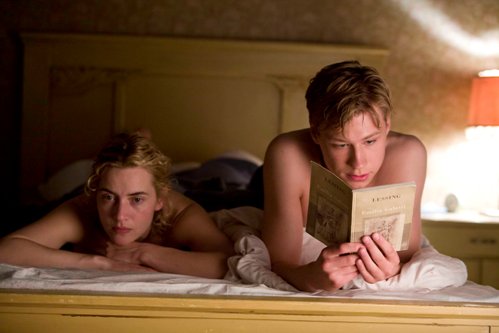The Reader starts off almost like a German Summer of '42 except it's 1958 and it doesn't take place in the summer -- well, some of it does. My point is that, other than advance publicity of the film, you'd never know it had the serious overtones that eventually intrude into our midst.
It is also misleading in that Ralph Fiennes, one of the two top-lined stars of the film, is barely in it, while Kate Winslet, the other billed star is being touted for supporting actress, though she is pivotal throughout the piece.
The main star is David Kross, a hitherto unknown 18-year-old German actor, who speaks English flawlessly and is utterly captivating as a young boy we first meet at fifteen, who serendipitously meets an older woman with whom he has an eventful, albeit brief, affair.

Kross portrays the young Michael Berg (Ralph Fiennes plays him interspersed in the film already grown-up) and after feeling queasy on the bus ride home from school he gets off and throws up in the courtyard of an apartment building. Then, Hanna Schmitz, played by Kate Winslet, comes home from work and at first scolds the boy for making a mess. Her better nature takes hold and she helps Michael to recover and then insists upon walking him home.
He is diagnosed with Scarlet Fever, but the normally ominous consequences do not occur and he recovers perfectly after recuperating for three months, frankly making us wonder what was the point? When he is out of bed he tells his mother about Hanna's help, and he is instructed to write a note of thanks, which he embellishes to a bouquet of flowers and it leads to lust.
What ensues is a lovely tale of love during which Hanna is very inquisitive and intrigued by his studies. As part of their foreplay he reads to her from a myriad of classics ranging from The Odyssey to The Adventures of Huckleberry Finn and regales her switching his delivery and accent to conform to the style and text of each book. Then their tryst ends very suddenly and without any warning. Hanna leaves without a trace, and Michael is forced to suffer silently and go on about his life.
Throughout all this, we cut back and forth to glimpses of grown-up Michael's life as a successful lawyer, and his anxiety because he is about to be reunited with his somewhat estranged daughter.
Then pop, we go back in time and meet a now 23-year-old Michael (Kross again) in law school, where he takes a sparsely populated legal seminar led by Professor Rohl, played genuinely and to the point by Bruno Ganz. As part of the course he takes his students to see a real trial in action, and this is where the story takes off and reverberates. Six women are being prosecuted as former Nazi prison guards, and Michael is shocked to see that one of them is Hanna Schmitz.
What transpires is a mix of disbelief, revulsion and a sense of profound guilt, because he finds himself in the position to help mitigate the charges against her, but for reasons not too clear he falls short at the last minute. His shame obsesses him throughout the years until a package arrives at the prison where Hanna is now serving a life sentence, the contents of which manage to pick up and resume their love affair over the years.
To say the film is poignant is an understatement, and that a character such as Hanna's can have redemption is hard to believe. But Kate Winslet succeeds much more in this film, and her character is far more three dimensional than the role she played in Revolutionary Road,which I have already reviewed.
David Kross is lovely and immensely sympathetic, even as he doesn't quite do the right thing when he has the chance. He is attractive but not enormously handsome and lends just the right innocence to the earlier part of his role and the maturity when he is almost ten years older.
Ralph Fiennes provides the wrap around and does so in an effective manner, in the reunion with his daughter, his involvement with the older Hanna and in an epilog of sorts with a concentration camp victim, played by Lena Olin, whose book about being a survivor is what did Hanna in so many years earlier.
I'm not sure the scene between Fiennes and Olin is as realistic as such an encounter would be and it seems a bit jerky and pretentious, though Olin is quite credible and lovely living a very successful Manhattan life still afflicted with the pain suffered during World War II.
On the whole David Hare has written a fascinating and engrossing script, based on the book Der Vorleser by Bernhard Schlink. Director Stephen Daldry has given us a taut and emotional filmmaking achievement to go hand in hand with his earlier and dissimilar works, The Hours and Billy Elliot. It is altogether a shame that this film, with its unexpected story line and odd events, will probably not reap lots of money, but hopefully the major awards purveyors will yield the necessary nominations to attract the resulting larger audience, which it surely deserves.
